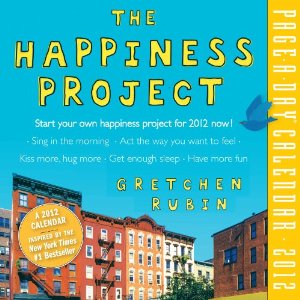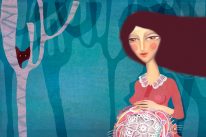
Update: The winner for this giveaway has been chosen. Subscribe to Tiny Buddha for free daily or weekly emails and to learn about future giveaways! The winner: +sp.
I was perhaps the last person on the face of the planet to read The Happiness Project.
Earlier this year, a friend connected me with Gretchen Rubin, which prompted her to interview me for her blog. After I spent some time exploring her archives, I realized I needed to learn more.
If you’ve read The Happiness Project, you know Gretchen balances ancient wisdom with contemporary research to create a personal roadmap for happiness that hinges upon everyday choices.
She spent a year test-driving various “resolutions” for joy in a methodical, measurable way, and chronicled her experiences both on her blog and in her book.
One thing that drew me to Gretchen’s work is her admission that she was not unhappy before—she simply felt she didn’t appreciate the things in her life that might otherwise have made her happier.
While we all have different challenges, I suspect this is something we can all relate to.
I’m excited that Gretchen took the time to answer a few questions, and also that’s offered to give away one copy of her 2012 Page-A-Day Happiness Project calendar.
The Giveaway
To enter to win:
- Leave a comment on this post.
- Tweet: RT @tinybuddha Interview and Giveaway: Gretchen Rubin of The Happiness Project http://bit.ly/tvUOZt
You can enter until midnight PST on Sunday, November 13th. If you don’t have a Twitter account, you can still enter by completing the first step.
The Interview
1. It’s been two years since you released your wildly popular book, The Happiness Project. Did you feel an increase or decline in your happiness after you stopped working on the book part of the project?
I still write every day about happiness—both for my daily blog, and for my next book, Happier at Home—so I’m deeply and happily immersed in the subject, and still making progress in making my life happier.
2. You shared a great deal about your life in your book, and you continue to do that on your blog. Are there certain parts of your life you’ve decided are off limits in your writing? If so, why?
Absolutely. I wouldn’t want to write a book about happiness that made someone I love unhappy, by feeling over-exposed. I don’t write about sex. I never criticize anyone but myself. However, the restrictions that I observe allow me plenty of room to explore the points I want to address, so I don’t feel constrained by them.
3. How does your blog affect your happiness—and what parts of blogging do you enjoy the most?
My blog has added hugely to my happiness. I love getting a little idea or interesting bit of information out there every day. I get a tremendous benefit from being in contact with engaged, thoughtful readers and bloggers. And creatively, it’s such a fun form! When I started, I never imagined that I would take to blogging, but now I can’t imagine life without it.
4. One thing I really enjoyed about your book is that you’re highly self-aware and honest about the things that impact your happiness (like the desire to get credit—or gold stars—when you do good things for people). Do you feel that self-awareness is integral to happiness?
I think self-knowledge is a KEY to happiness. We can build happy lives only on the foundation of our own natures, our own values, and our own interests. But without self-knowledge, it’s easy to create a life that doesn’t reflect those elements. It’s odd—you’d think that knowing yourself would be a very easy, obvious task, but it’s a tremendous challenge that lasts a lifetime.
5. You’ve written that The Happiness Project is aimed at “ordinary unhappiness,” not depression. How would you define “ordinary unhappiness”—and how common do you think it is?
I think many people feel that their lives could be happier than they are. A happiness project is an approach to making your life as happy as it can be, given your nature and your circumstances. Rather than worrying about defining “happiness” and “unhappiness” and deciding what categories fit, I think it’s helpful to think about striving to be happier.
6. What’s the main message you hope people take away from The Happiness Project, in print or online?
That it is possible to be happier, by taking small, manageable steps in our ordinary lives. Happiness is right here, right now.
7. You have a 2012 Happiness Project calendar coming out—and I’m excited to get my hands on one! What else is next for you?
Thanks! I had so much fun putting it together. My next book is coming out July 31, 2012. It’s called Happier at Home and is about a happiness project I undertook to focus on making my home happier. I started it last September (September—the new January) and worked through May to make my home more homey. I looked at issues such as possessions, time, marriage, parenthood, body, and neighborhood. It was such a joy to write this book.
FTC Disclosure: I receive complimentary books for reviews and interviews on tinybuddha.com, but I am not compensated for writing or obligated to write anything specific. I am an Amazon affiliate, meaning I earn a percentage of all books purchased through the links I provide on this site.
About Lori Deschene
Lori Deschene is the founder of Tiny Buddha. She started the site after struggling with depression, bulimia, c-PTSD, and toxic shame so she could recycle her former pain into something useful and inspire others to do the same. You can find her books, including Tiny Buddha’s Gratitude Journal and Tiny Buddha’s Worry Journal, here and learn more about her eCourse, Recreate Your Life Story, if you’re ready to transform your life and become the person you want to be.
- Web |
- More Posts













 Though I run this site, it is not mine. It's ours. It's not about me. It's about us. Your stories and your wisdom are just as meaningful as mine.
Though I run this site, it is not mine. It's ours. It's not about me. It's about us. Your stories and your wisdom are just as meaningful as mine.
Let’s be happy… Count me in!
Have read the book from the library and would love to have it
I read Gretchen’s blog every day and would love to win!
I retweeted about this, but I wanted to stop in to comment about how much I enjoyed Gretchen Rubin’s book.
Great interview! I subscribe to both your and Gretchin’s blogs in my RSS. Look forward to the wisdom of happiness daily.
Love this book and Gretchen’s blog. The part of her book about tackling clutter inspired me to begin tackling some of mine. What a difficult process that is, but it is amazing how much freer you feel when you are able to let go of some of it.
Thank you Gretchen and Lori! Happy is as happy does!⊰ॐ♥ॐ⊱
I would love this book!
Thanks Lori!!
I recently finished reading The Happiness Project and absolutely loved it! I am currently working on creating my own happiness project to start in the New Year!
would love to win a copy 🙂
Keep me where the happy is!
Yes! Outer order contributes to inner calm. Love it!
Very interesting. My husband and I are always looking to get to that happy place!
i’ve never heard of this book, but it looks really interesting. might have to go to the book store after work. :] thanks a bunch!
This one has been on my “To Read” list for a while! Thanks for the opportunity to win a copy.
Lori, you can’t be the last person to read the book because I haven’t read it yet! I would like to though. Sign me up. Off to tweet it too.
I’ve been wanting to read this book for quite some time now–I think it’s a great idea. And good for you, Gretchen, for writing on your blog everyday!
Def sounds like a must read! We could all use a bit of sunshine these days!
While I haven’t read this book yet, I just realized this moment that I was SO UNHAPPY when this book came out, that I didn’t want to read it. On some level, I didn’t want to examine how or why I was so unhappy. Fast forward a couple of years, and a divorce, and I am no longer spectacularly unhappy! This required a lot of work, and now I am ready to become more happy. I would love to win this giveaway.
I’ve been dying to read this too!
I haven’t read this book, I haven’t even heard about it either! Seems interesting though
I LOVED reading this book and would absolutely recommend it to anyone. Thanks to Gretchen, I plan on doing my own “Project” this coming New Year and the calendar would help boost my motivation to put my ALL into it!!
Ah, I remember when this book came out too, stuck in high school still, depressed to the point of almost wanting to drop out. I saw it in the book store and it caught my eye. Neat covers like that one always do. I never read it though. I think I was feeling just as Gwennie52 was. But somehow it never left the back of my mind. I’m not really set on the giveaway, it’s been years now and I’ve gotten through quite a few things. But does anyone know if you can have a bookstore order in books? haha
It would be fabulous to win this calendar. Please consider me! I could really use this in my office. It certainly could help lift all of our spirits!!! Thanks for all the good work you do!
I’ve read the book multiple times since it came out and gotten ideas each time. I also read Gretchen’s blog faithfully (since before the book was published) and I look forward to the next book! Still waiting for her to write about the career change to writer, I think that would help a lot of folks. I’d enjoy the calendar as a daily reminder to work on myself and my happiness.
I’d love to win this book! I have many of your quotes posted on I desk at work 🙂
Great post! Wishing more happiness and joy for everyone!! I’ve got to read this book–maybe I’ll win it 😉
I love Gretchen’s blog and have been wanting to purchase this book…
I think I am the only person who hasn’t heard of this book ! But it seems like a beautiful thing and just by reading the interview it made me smile. Thank you for posting this!
I have also not read the Happiness Project and would LOVE a chance to read it.
Appreciate the information on the happiness project. It sounds like a book that everyone can benefit from!
Hope I win this!
I bought The Happiness Project at the Atlanta airport. I was scanning the shelves for something to read on my flight and the title grabbed my attention. On the flight, I enjoyed a conversation with the gentleman next to me when he asked me about the book. Had it not been for the book, I probably would have missed out on meeting and talking to this delightful man. The ironic part is that I hadn’t even opened the book to read it before he started asking me questions about it. After finishing the book I realized how important it is to step out of your comfort zone and experience new things and in this case, people! It’s a great book and offers some great bits of wisdom.
Thanks for introducing us to Gretchen. I will definietly check out her Blog and her book – The Happiness Project. Keep spreading the peace!
It would be helpful to me! Thank you.
Sounds like I could benefit greatly from this book. Thank you for offering it.
What a great way to focus on happiness with a daily calendar! Thank you for offering this!
Love The Happiness Project! Read the book and check the blog regularly. I especially love the toolbox section. There are great quotes, and it’s fun to read other people’s ideas on happiness.
Wonderful interview Lori 🙂 I have several friends who’ve read The Happiness Project, and now I think it’s my turn.
I also have a great idea: I could also give this book as a present to the moms of the children in need (my foundation Peg’s Presents helps). I think they would cherish such a gift, and so would I!
xo
~ Lee
Love it – great interview! This must mean that actually *I* am the last person on the face of the planet to read the book 🙂
We could all use a little more happiness.
this is very inspirational! would love to read the book!
This was a great book. Now reading her interview I was a more depressed unhappy and I was searching I think in the wrong place to “fix” it. But I did pull some things from her book that did make a difference. Definitly glad I read this book and would and have recommended it to several people.
the book sounds very intresting.i would like to read the book.
I’m in the middle of reading this book and LOVE it. Winning the calendar would be icing on the cake!
Lori, you are not the last person on the face of the planet to read “The Happiness Project.” I haven’t read it, but it sounds wonderful.
I haven’t read it either. Would be happy to get a free copy!
Looking forward to reading this book!
Would love to have a copy! 🙂 Who can’t use more happiness?!